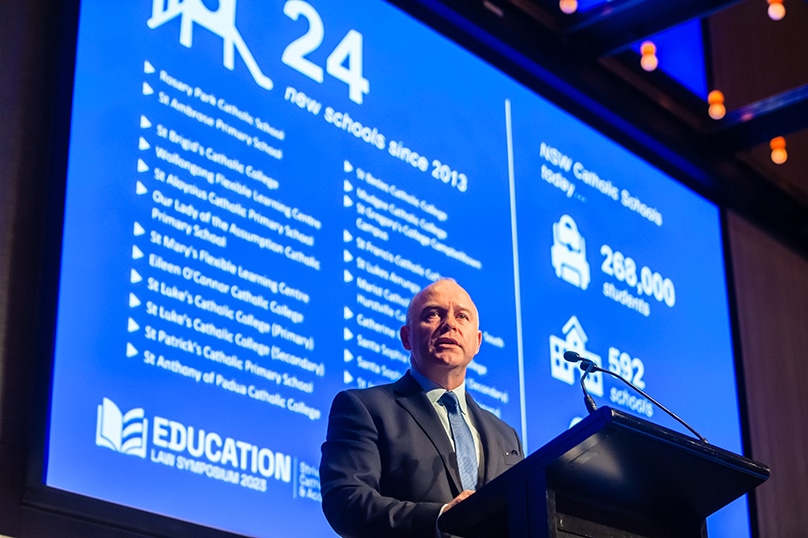
The COVID-19 pandemic has had a lasting negative effect on school attendance and student opportunity, with measures designed to protect students now confirmed to have had a “clear impact on mental health and wellbeing,” the CEO of Catholic Schools NSW, Dallas McInerney, has said.
Yet despite the shock of COVID-19, NSW Catholic schooling is experiencing its strongest enrolment growth in a decade, with more students in more schools than any other time in Australian history.
In a wide-ranging address at the 2023 CSNSW education law symposium on 6 July, Mr McInerney said student absenteeism is “running above long-term averages” and that recent academic studies have described school closures and student isolation as a “collectively traumatising event” producing a “wave of youth mental health crises.”
Quoting from the Faultlines report produced by an independent COVID-19 inquiry under former Department of Prime Minister and Cabinet secretary Peter Shergold, Mr McInerney said schools should have remained open during the COVID-19 pandemic, “particularly once new information indicated that schools were not high-transmission environments.”
What teachers and school leaders “knew intuitively has now been confirmed, absolutely,” he said.
“In trying to make sense of the future, are there any lessons from the experiences of 2019, 2020 and 2021?” he asked.
“Would we as accepting or uncritical of every response from government, if, God forbid, we experienced another health pandemic? That is an open question for me.”
Mr McInerney added that the COVID-19 pandemic showed the need for Catholic education “to continue to have a strong public voice, respected by decision-makers, hard to ignore,” and said that CSNSW’s advocacy “was a voice for keeping schooling as normal as could be,” including by insisting that the HSC went ahead during the pandemic.
The CSNSW CEO’s address also touched on the continuing relevance of schools in the wake of technological change and the pandemic, calling demands for radical reform of education “premature.”
Catholic education in particular needs physical schools and in-person classes for the sake of evangelisation, which Mr McInerney said was “not a mission easily fulfilled via a Zoom platform with 25 tiles staring back at a child in their bedroom, with unreliable internet connectivity.”
In 2023 there were more Catholic schools in NSW with more students than in any time in history, he said, and were enjoying the strongest growth in enrolments in a decade.

“Ours is a growth story … We continue to build new schools, and we are in a golden era of capital development and upgrades of our facilities across NSW,” he said.
Mr McInerney said two key issues for Catholic schooling into the future were religious freedom, which he described as “one of the defining issues of our times” and the implementation of a new curriculum for NSW schools.
“In a pluralist society, arrangements where non-government parties—including faith based institutions—work in cooperation with the government for the delivery of social services have long been accepted,” he said on religious freedom.
“It’s a model that makes economic sense, finds favour with the community and supports social cohesion, acting as a unifying force of what otherwise might be disparate interests and pursuits.”
Describing the Gospels as “hope-filled,” Mr McInerney encouraged teachers dedicated to the mission of Catholic education to defend it by providing a high-quality education and give graduates the chance to take up opportunities as Australians and Christians.
“From this, we build on our social capital with all stakeholders, inside and outside of government,” he said.
Mr McInerney also told attendees that Catholic, independent and government schools have for the first time convened whole-of-sector professional advisory groups to work on the new curriculum.
“These networks are bringing the collective insights and judgments of our teaching professionals to this once in a generation task,” Mr McInerney said, adding that Catholic education is well-represented in the process.
CSNSW will host a conference on curriculum reform later this year.
